2020 Vision: The first week of the rest of the campaign begins
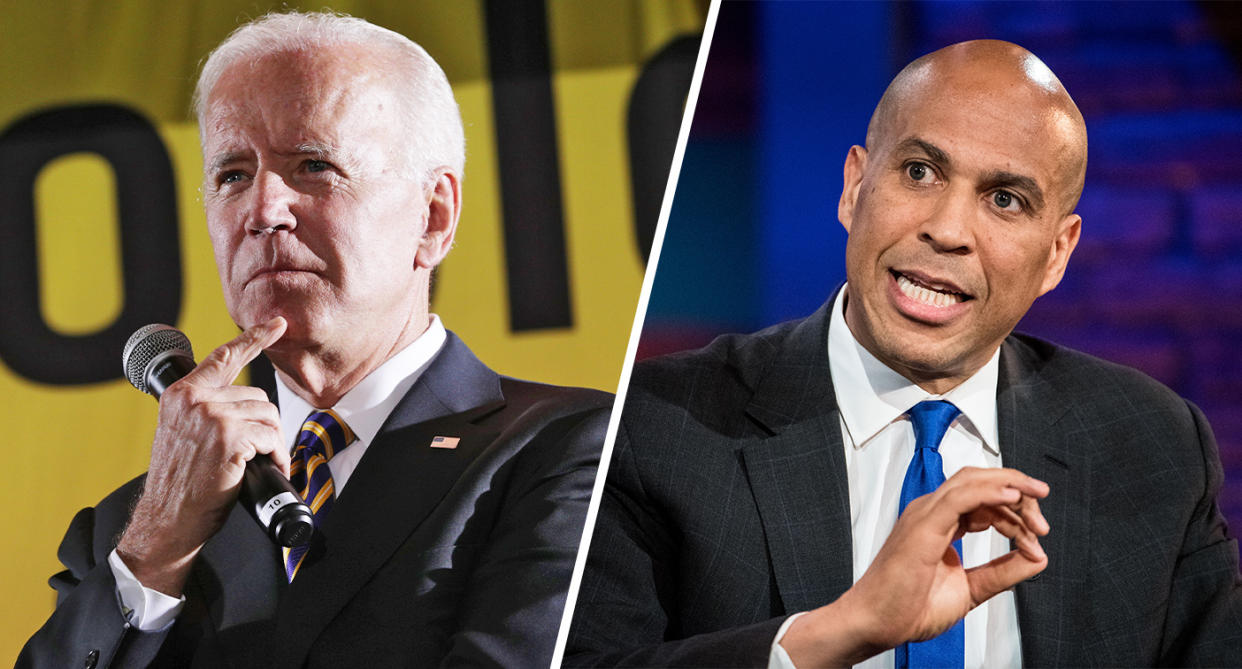
Welcome to 2020 Vision, the Yahoo News column covering the presidential race. Reminder: There are 227 days until the Iowa caucuses and 500 days until the 2020 presidential election.
Dem candidates court Clyburn at annual fish fry
Over the next week, the 2020 Democratic candidates are going to be spending a lot of time in close proximity to one another. First comes this weekend’s festivities in South Carolina, starting with the Blue Palmetto Dinner and Rep. James Clyburn’s “World Famous Fish Fry” on Friday night, which 22 of the 23 candidates will attend. (Montana Gov. Steve Bullock had other fish to fry, in New Hampshire.) On Saturday, 21 candidates are set to speak at the South Carolina Democratic Convention. With voting set for Feb. 29, South Carolina is the fourth primary state but the first where African-Americans, a key part of the Democratic constituency, will have a major say in the party’s nominating process.
"It really is going to be ground zero for the campaign," Columbia Mayor Steve Benjamin told CBS News this week. "It's going to give all of the candidates a chance to show what they are made of, to show the human side. You can't get tired shaking hands ... It's show time."
There will also be major events in Miami, where eight candidates are set to speak at the National Association of Latino Elected and Appointed Officials convention Friday. And Miami is where NBC News will host the first debates of the 2020 cycle on Wednesday and Thursday nights. (Only 500 days until the next presidential election, after all.) Wednesday night will include just one of the top-polling candidates, Sen. Elizabeth Warren, along with Sen. Amy Klobuchar, Sen. Cory Booker, Rep. Beto O'Rourke and others. Thursday night has the rest of the front-runners: Vice President Joe Biden, Sen. Bernie Sanders, Sen. Kamala Harris and South Bend, Ind., Mayor Pete Buttigieg. In addition, night two will include the two candidates who've never been elected to office, entrepreneur Andrew Yang and spiritualist author Marianne Williamson.
Three declared candidates, including Bullock, failed to make the cut.
A major theme going into the first set of debates is how many shots are going to be taken at Biden, who’s led in most polling but has seen his numbers slip somewhat since their peak in mid-May. Biden skipped out on a large gathering of Democratic candidates in Iowa earlier this month, citing family commitments, and for unknown reasons declined to participate in a series of video interviews with the New York Times that enlisted virtually all the others running.
The debate participants will not have much time to make their cases in 120 minutes (less time for questions and commercials) split 10 ways, but the event will give a chance for lesser-known candidates to capture some attention. The format will be repeated on two nights in July, but the qualifications for the next debate, in September, are tighter: 130,000 donors and 2 percent in at least four Democratic National Committee-approved polls.
[For up-to-the-minute updates, follow Yahoo News’ Brittany Shepherd, who will be covering the candidates in Columbia and then on to Miami.]
Should a Democrat work with racists? Booker and Biden face off
As Biden prepares to share the stage with other 2020 candidates for the first time next week in Miami, some of his fellow Democrats are starting to target the polling leader. This week Booker took umbrage at comments Biden made at a fundraiser where he claimed credit for his work with arch-segregationist Sen. James Eastland (and other racist lawmakers) in the 1970s. Eastland, a longtime Mississippi Democrat, referred to blacks as “an inferior race” and offered to help Biden with an anti-busing bill early in the Delaware senator’s career.
“He never called me ‘boy,’” Biden said of Eastland. “He always called me ‘son.’”
“You don’t joke about calling black men ‘boys,’” said Booker in a statement. “Men like James O. Eastland used words like that, and the racist policies that accompanied them, to perpetuate white supremacy and strip black Americans of our very humanity.”
At a fundraiser that night, Biden was asked if he would apologize for touting his work with Eastland.
“Apologize for what?” Biden said. “Cory should apologize. He knows better. There's not a racist bone in my body.”
Members of the Congressional Black Caucus (including Rep. John Lewis, a civil rights icon) and House Speaker Nancy Pelosi defended Biden, who has been attempting to make the case that his ability to work with political opponents will restore civility to Washington. A phone call between Biden and Booker did not resolve the issue as their surrogates continued to battle it out.
VIDEO: Rep. John Lewis with a powerful defense of @JoeBiden: "I don't think the remarks are offensive. During the height of the civil rights movement we worked with people and got to know people that were members of the klan...We never gave up on our fellow human being..." pic.twitter.com/NvkmurjsBG
— Alan He (@alanhe) June 21, 2019
Booker is not the only one to take a shot. O’Rourke went after Biden earlier this month on MSNBC, saying the country could “do far better,” citing the former vice president’s foreign policy record (he voted for the invasion of Iraq in 2002) and support — which he reversed only two weeks ago, under pressure — for a ban on using federal funds to pay for abortions.
“You've got to ask yourself where Joe Biden is on the issues that are most important to you,” said O’Rourke. “Did he support the war in Iraq that forever destabilized the Middle East? Did he really believe that women of lower incomes should be able to make their own decisions about their own body, to be able to afford health care in order to do that? He supported the Hyde Amendment; he now opposes the Hyde Amendment.”
Warren’s history of disagreement with Biden goes back a decade and a half, when Warren, then a Harvard law professor, testified against a bankruptcy bill that Biden championed. The legislation — pushed by banks, Republicans and some centrist Democrats — eventually passed. Warren maintains it puts obstacles in the path of Americans seeking to escape medical or credit-card debt; it was supported by credit-card issuers, an important industry in Biden’s home state of Delaware. Their clash in a Senate hearing was epic, but with the two appearing on different nights next week, a face-to-face reenactment will have to wait until July at the earliest.
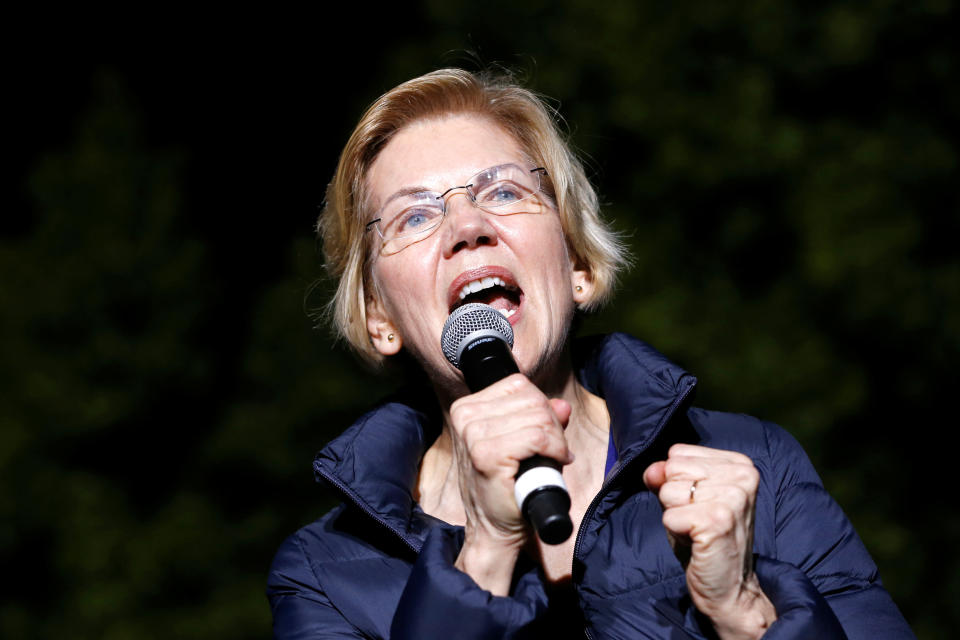
Warren calls for abolishing for-profit prisons
In her latest policy proposal, Sen. Elizabeth Warren on Friday announced her plan to close all of America’s private prisons.
“There should be no place in America for profiting off putting more people behind bars or in detention,” Warren wrote in a Medium post. “The government has a basic responsibility to keep the people in its care safe — not to use their punishment as an opportunity for profit. That’s why today, I’m proposing my plan to root out once and for all the profit incentives perverting our criminal and immigration systems.”
She said her administration would ban the federal use of private prisons and detention facilities by ending all contracts that the Bureau of Prisons, ICE and the U.S. Marshals Service have with private detention providers; stop contractors from charging service fees for essential services, like phone calls and health care; and expand oversight of the U.S. prison system.
Critics believe the privatization of prisons has led to higher incarceration rates. According to a 2018 study from the Sentencing Project, the number of people in private prisons increased 47 percent between 2000 and 2016, compared with a 9 percent rise in the overall prison population.
Warren's plan is the latest proposal by a 2020 candidate for criminal justice reform. Bernie Sanders regularly rails against what he calls the "prison-industrial complex."
"We are going to end the international embarrassment of having more people in jail than any other country on earth," Sanders said in a speech in South Carolina in March. “Instead of spending $80 billion a year on jails and incarceration, we are going to invest in jobs and education for our young people. No more private prisons and detention centers. No more profiteering from locking people up."
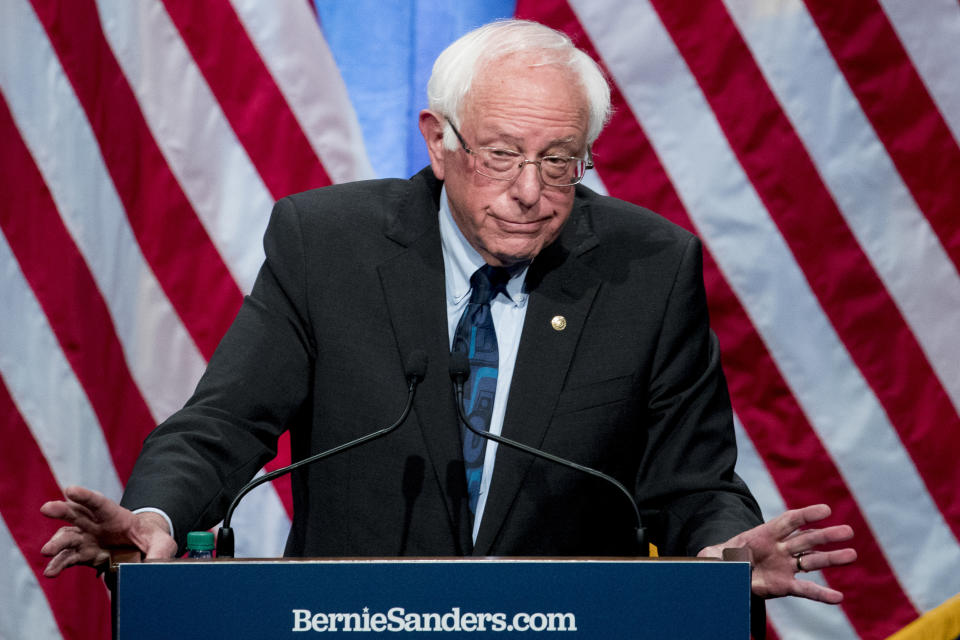
Bernie’s primary strategy: Take on Trump
Like Joe Biden, Bernie Sanders has spent the bulk of the 2020 Democratic presidential primary attempting to bypass it entirely and lay the groundwork for a general-election matchup with President Trump.
This week, the Sanders campaign sent daily emails to supporters highlighting his lead over Trump in numerous national polls.
"Bernie beats Trump,” repeated seven times, read the subject line of a Tuesday-afternoon email blast from the Sanders campaign. It even produced a new campaign sticker to hammer home the idea.
And Sanders stayed up late on Tuesday to deliver a live-streamed response to Trump's reelection kickoff rally in Orlando.
"It's going to take me a little while to settle down because I just had the extremely unpleasant experience of actually watching Donald Trump in action for an hour and a half," Sanders said. "An hour and a half of lies, distortions and total, absolute nonsense."
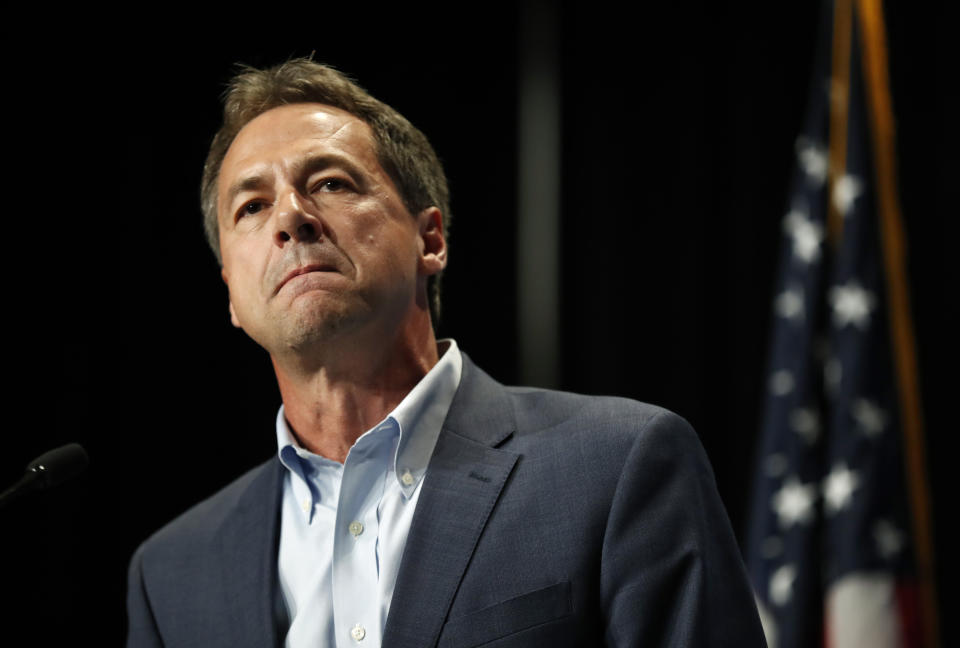
Bullock makes the most of missing debate cutoff
The most prominent Democrat missing from next week’s debate is Montana Gov. Steve Bullock, who, as he frequently points out, is the only candidate in the race who won election in a state that went for Trump in 2016. Bullock delayed his entry into the race until his state’s legislative session ended and fell short of qualifying for this month’s debate, drawing some criticism that the Democratic National Committee’s system for choosing candidates was flawed.
But missing out hasn’t been the worst thing for Bullock. Most important, he’s already qualified for the July debate, so he’ll likely be on the stage in Detroit next month. And he has been campaigning as an outsider, releasing an ad playing off the debate snub; he was the recipient of a fundraiser hosted by actress Jane Fonda and was featured on MSNBC in a segment about how he was fighting climate change in his home state. Bullock announced he would be spending the two debate nights next week in Iowa and New Hampshire, participating in locally televised town halls that air prior to the larger Democratic forums.
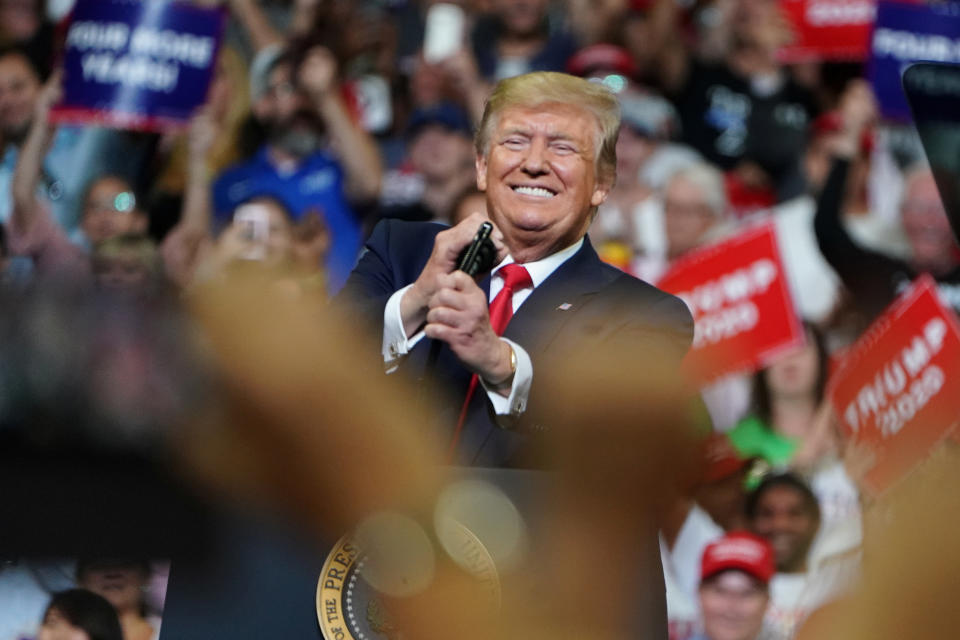
Donors dig deep for Trump reelection
In a 24-hour period around a rally billed as the kickoff to his reelection campaign, President Trump received nearly $25 million in donations, the Republican National Committee said this week.
“The enthusiasm across the country for this President is unmatched and unlike anything we’ve ever seen!” RNC Chair Ronna McDaniel tweeted.
RNC chief of staff Richard Walters told Yahoo News that the $24.8 million total includes contributions to the Trump campaign directly and to Trump Victory, the joint fundraising arm for the campaign and the RNC.
The RNC took in $10.8 million from major donors at two fundraising events, while the Trump campaign raised $8 million through a phone drive and about $6 million in online donations. (The average online donation was $44, Walters said.)
Trump’s one-day haul is nearly four times the amount former Vice President Joe Biden raised in the first 24 hours after announcing his 2020 presidential campaign.
And it’s more than what the five top-polling candidates in the race for the Democratic nomination raised in the first quarter combined.
Off2Miami! @BernieSanders in Seat 15A Thought Bubble: "Is she going to kick my chair? I know she's going to kick my chair! Elizabeth, don't even think of kicking my chair!" @ewarren in 16A Thought Bubble: "I'm going to kick it the exact moment he thinks I won't." @thehill pic.twitter.com/jOTAJSyIwu
— Steve Clemons (@SCClemons) June 21, 2019
Verbatim
“I think that there are [a] certain number of people who would like to see a woman elected, and I understand that. There are people who would like to see somebody who was younger, and I understand that also. There are a lot of factors out there.”
— Bernie Sanders on Elizabeth Warren’s rise in the polls
“We’ve probably had excellent presidents who were gay — we just didn’t know which ones.”
— South Bend, Ind., Mayor Pete Buttigieg, who if elected would be the first openly gay U.S. president
“I think it’s wonderful that a young man from South Bend, Ind., who speaks a hundred languages, was a military vet, went to Oxford and Harvard and just happens to be gay is part of the conversation in the Democratic race.”
— Vogue editor Anna Wintour on Pete Buttigieg
“Not Donald Trump.”
— Who the Orlando Sentinel said it is endorsing for president in 2020. The newspaper didn’t specify who it would support against Trump.
“Donald Trump promised to bring our troops home. Instead he has pulled out of a deal that was working and instigated another unnecessary conflict. There is no justification for further escalating this crisis — we need to step back from the brink of war.”
— Elizabeth Warren on Trump’s approval of a retaliatory military strike against Iran, which he called off at the last minute
155
— The number of times former Trump communications director Hope Hicks and her legal team refused to answer questions in closed-door testimony before the House Judiciary Committee
“My wife.”
— The answer given by at least five Democratic presidential candidates when asked by the New York Times to identify their hero
Read more original 2020 coverage from Yahoo News:





